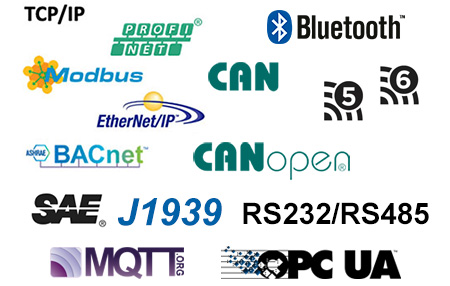





Industrial EtherNet and Wireless
We offer you the optimum products for your automation task. Network your machine components or realize flexible access to your machine with our Industrial Wireless or Industrial EtherNet devices. Ensure the highest possible machine availability / OEE by using our reliable network components.
Whether PROFINET, EtherNet/IP, ModbusTCP, BACnet/IP, CAN, CANopen, ModbusRTU or Powerlink, we offer you solutions for transmitting your data for a variety of different industrial protocols.
Industrial EtherNet Switches
Discover our Industrial EtherNet switches, which have been specially developed for use in industrial environments. We offer you unmanaged switches with Gigabit, PoE, outstanding electrical and mechanical properties for DIN rail mounting.
- Unmanaged switches
- DIN rail mounting
- PROFINET-capable
- Metal or plastic housing
- Fast to Gigabit

Industrial Wireless
Get to know our range of industrial wireless products and connect your devices without the limitations of cable connections. Our products offer you reliable and flexible communication solutions.
- Wireless Bridge
- Wireless Access Points
- Bluetooth Low Energy
- Up to IP67 possible
- EtherNet, serial and CAN interfaces

Industrial mobile radio
Use our industrial routers for fast internet access via LTE/3G to monitor machines and devices remotely and transfer relevant data. We offer you a complete solution with EtherNet RJ45 connection, radio modem, GPS tracker and dual antenna in one unit with an innovative form factor for stationary and mobile devices.
- 4G networks with fallback to 3G
- PoE power supply possible
- GPS functionality
- IP66/IP67 housing
- MQTT / OPC UA compatible
Industrial EtherNet is the umbrella term for the use of the Ethernet standard in industrial environments and is considered the successor to the classic fieldbus. In contrast to conventional Ethernet components, which are designed for offices or private households, Industrial Ethernet components were developed for the harsh environmental conditions and high requirements in production plants, factories, energy supply companies and other industrial applications.
A variety of different protocols can be transmitted with Industrial Ethernet, such as EtherNet/IP, PROFINET, Modbus/TCP and others. The various standardized protocols make it possible to integrate different devices and machines in a network and ensure smooth communication and data transmission.
The advantages of Industrial Ethernet include the ability to transfer IT and OT data in the same network simultaneously, to transfer large amounts of data in a short time, to integrate almost any number of participants and to implement real-time applications.
Industrial wireless refers to the use of wireless network technologies in an industrial environment. Devices in this area are specially designed for the requirements of the industrial environment.
Wired data transmission can be realized using various technologies such as Bluetooth, Bluetooth low Energy or LoRaWAN. The different technologies have different advantages and disadvantages, making them differently suitable for one and the same application.
One of the advantages of industrial wireless is the ability to connect devices and systems that could otherwise only be connected using wear and tear connections such as slip rings. The use of a radio link also offers a high degree of flexibility and enables a simple and, in some cases, considerably cheaper solution for network implementation.
Industrial mobile radio refers to the use of the mobile radio standard in industrial applications. In comparison to mobile radio applications used in private households or offices, industrial mobile radio components are developed for use in industrial applications such as production facilities, factories, energy supply companies and others.
Common applications of industrial mobile radio technology are, for example, the central monitoring and control of decentralized machines and systems. In addition, machines and systems can be maintained remotely with the help of mobile communications technology.
One of the advantages of industrial mobile communications is the ability to gain access to a machine without having to be on site or have a physical connection. This means that a machine can be continuously monitored, failures can be prevented and downtimes can be rectified without long delays.






